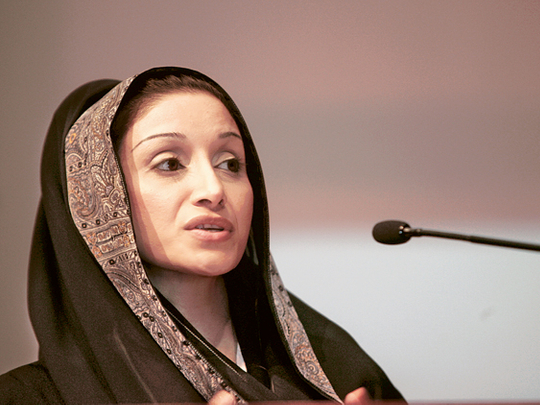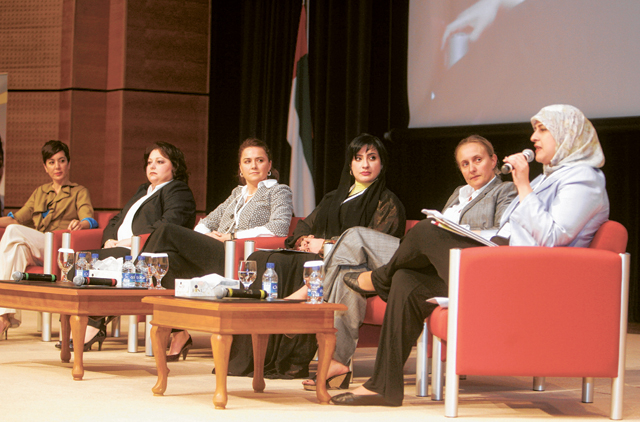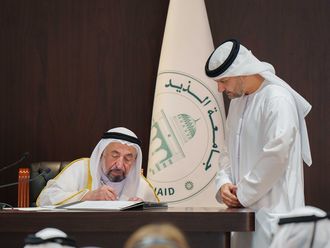
Dubai: Students at Dubai Women's College (DWC) were urged to champion the struggle for gender equality in the Middle East and Asia region through social media activism.
Najla Al Awadi, former member of Federal National Council and Deputy CEO of Dubai Media Incorporated, spoke to students at the college's celebratory conference for the 100th International Women's Day last week.
"Gender inequality is a significant obstacle for human development in the Arab region," she said, referring to the Arab human development report prepared by the United Nations Development Programme (UNDP).
"I stress that as women each one of us has a role to play in advocating and lobbying for the empowerment of women," said Najla. "I urge you to become social media activists and take time to mention issues fundamental to the progress of the UAE and gender equality in our world while online."
Female illiteracy
"Arab countries collectively have one of the highest rates of female illiteracy in the world," said Najla. "Lack of education and gender discrimination combined keep the percentage of employed Arab women at 33 per cent — the lowest in the world."
She added that the staggering illiteracy rate contributes to unhealthy living, which results in increasing rates of disease and death linked to pregnancy and childbirth.
Also Arab women's participation in politics is marginal. The regional average of women's participation in Arab state legislatures is currently below 10 per cent. This makes it the lowest regional figure in the world, which is significantly lower than the world average of nearly 18 per cent.
"Studies show the inclusion of Arab women in the political process has not matched their economic power, specifically in the Arab Gulf countries," said Najla. "This includes the UAE where the collective wealth held by women is estimated to be at $350 billion (Dh1.3 trillion) — but these women do not have an equal voice to their male counterparts."
Najla noted a significant lack of laws protecting women from violence in Asia despite widespread evidence of discrimination and assault. "One-tenth of women in our region report being assaulted by their partners," she said. "There are no provisions against sexual harassment in the workplace even though nearly 40 per cent of working women report experiencing verbal, sexual or physical abuse."
She added that despite laws guaranteeing equal pay for equal work, women in the region still earn considerably less than men. The pay gap ranges from between 54 to 90 per cent in some countries.
The UAE is a leading Arab nation when it comes to championing women's rights. However, Najla urged women to know their rights and read their nation's constitution, as it clearly states the equality of both genders in society. Yet these rights are not translated into reality.
She referred to existing gender inequalities such as how much women are paid in companies versus men and Emirati women's citizenship rights.
Empowerment
"An Emirati woman who marries a foreigner does not get citizenship for her children versus an Emirati man who does when he marries a foreigner," she said. "The constitution is a great platform to start from when talking about the empowerment of women in our society because you advocate a position based on knowledge."
Najla added that the empowerment of Arab women and those all over the world starts at home with the mothers.
"The idea of gender roles are taught to us at a very young age, primarily at home," she said.
"The source of the challenge starts when mothers teach their daughters to look beautiful and think of a wealthy man to marry; versus the sons who should be strong and successful — but that is so far from the reality we live today."
She added that the one key to empowering women and changing perspective is knowledge.
"You have to accept that lifelong learning is a must if you are going to be somebody who gives back in life," she said.
Figures:
-Only 1/3 of women are employed in the Arab world
-On average 10 per cent of women in the region participate in Arab state legislature
-The gender pay gap reaches 90 per cent in some Arab countries
-1/10 of women in the region report being assaulted by their partners
-40 per cent of Arab working women report experiencing verbal, sexual or physical abuse













